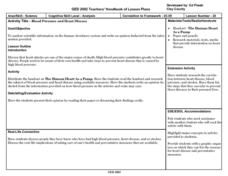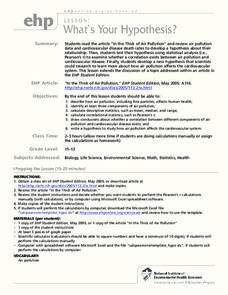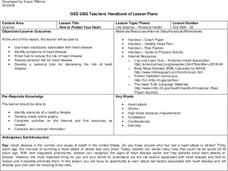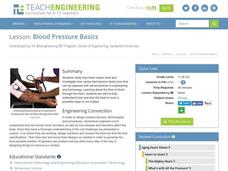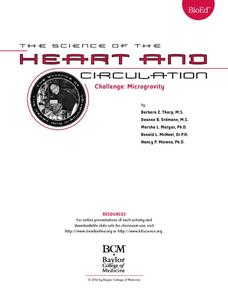Curated OER
Here's To Your Healthy Heart!
Students examine the primary controllable and uncontrollable factors that put one at greater risk for developing heart disease. Through discussion, research, physical tests, and questionnaires they determine whether or not they are at...
Curated OER
Human Body Series - Cardiovascular System
Pump up your class while studying the cardiovascular system with this pair of activities. In one, learners record heart rates during different actions. In the second, they read kid-friendly heart health articles online and then write a...
National First Ladies' Library
Heart Health: Awareness and Research for Women
Learners explore basic heart anatomy, review basic definition of heart disease, research different tests used to diagnose heart disease and heart attacks, discuss what constitutes a "healthy heart" lifestyle, and incorporate it into...
Curated OER
Blood Pressure and Heart Disease
Students explore the major causes of heat attacks as the topics of the human circulatory system, blood pressure, heart disease, arteries and veins are examined. Opinions on the topics are developed as researched material is presented to...
Curated OER
Heart Disease Prevention
Students create a PowerPoint presentation on heart disease. In this creative lesson students include symptoms, causes, treatments and ideas for prevention in their presentation.
Curated OER
What's Your Hypothesis?
Find the article, "In the Thick of Air Pollution," not through the resource link in the lesson plan, but through an Internet search. Have high schoolers read it and perform calculations with the statistics provided. The objective is to...
Baylor College
Examining the Heart
Break hearts with this lesson plan: chicken or sheep hearts, that is! Your class examines the external and internal structure of the heart with a dissection activity. A handy anatomy resource provides the necessary materials for...
Curated OER
Cardiovascular Disease and Fitness: Exploring the Rhythm of Your Pulse
Students explore several examples of cardiovascular diseases. In this anatomy lesson, students explain why physical fitness is very important. They count their pulse rate and record them on a data table.
Curated OER
Health Concerns Lecture
This lesson on health concerns includes a ton of information. There is a PowerPoint presentation that walks through the entire lesson. If you want a quick introduction to these topics then run through this slide presentation quickly, but...
Curated OER
How to Protect Your Heart
Students examine risk factors associated with heart disease and develop their own personal plans for decreasing the risk of heart disease.
Teach Engineering
Heart to Heart
Begin a unit on the heart, the parts and the function of the heart, and about heart disease with a resource that includes a lecture, a PowerPoint presentation, and research information. The lesson is the first of a four-part series and...
NOAA
Microfriends
Is there medicine found in the organisms that live deep below the surface of the ocean? The fifth activity in a six-part series has learners team up to research bacteria and the relationship it has with nearly every living thing on...
Biology in Motion
The Cardiovascular System
When resting, blood goes from the heart to the lungs and back in about six seconds. An animation of the heart starts simply by showing blood flow through the two halves. It builds in complexity slowly over the course of five slides,...
Curated OER
Brushing Teeth Halts Heart Disease
Ninth graders examine the causes and effects of Heart Disease. In this ESL Current Events lesson, 9th graders read an article on Heart Disease. Students complete guided questions on the reading.
Curated OER
The Heart Stopper
Use the pump from a spray bottle to drive a model of the heart in action! In addition to modeling the function of the heart and blood vessels, aspiring anatomists also simulate arterial blockage. They compare the effects of increased...
NOAA
Watch the Screen!
Can a sponge cure cancer? Life science pupils visit the drugstore under the sea in the fifth lesson of six. Working groups research the topic then get hands-on experience by testing the inhibiting effects of several plant extracts on E....
Teach Engineering
Blood Pressure Basics
Under pressure! The second lesson of the series introduces the class to blood pressure and the impact of high blood pressure on the cardiovascular system. It helps learners make the connection between blood pressure and how the heart...
Curated OER
A Healthy Heart is a Happy Heart
Students demonstrate their perception of what it means to have a healthy heart. They comprehend what each individual needs to do in order to ensure health and how to prevent heart disease.
Curated OER
Heart Disease & Stroke
Students study heart disease and how to prevent it. In this investigative lesson students list heart disease and stroke risk factors.
Curated OER
Heart 2: Changing Lifestyles and Heart Health
Students examine and evaluate changes in diet and lifestyle from prehistoric to modern times and how these differences have spurred the development (and better treatment) of heart disease.
Curated OER
The Crisco Lab: A Demonstration of Diabetic Complications
Students complete lab activities to illustrate the complications of diabetes. In this diabetes lesson, students work on labs that illustrate sugar in the blood and normal and atherosclerotic vessels. They demonstrate how diabetes can...
Texas Heart Institute
Exercise: What Kinds of Activities Are Best?
What happens in the muscles during anaerobic and aerobic exercise, and how does this affect the heart and our overall health? A cross-curricular instructional activity that introduces learners to the lifelong benefits of exercise,...
Baylor College
Challenge: Microgravity
What a festive way to examine what happens to the heart in different gravitational situations! Small groups place a water-filled balloon in different locations (on a table top, in a tub of water, and held in a vertical position), drawing...
Curated OER
What Increases the Risk of Cardiovascular Disease?
Students analyze the risk factors for cardiovascular disease and classify them according to whether or not they are controllable. They discover how to reduce the probability of high blood pressure through diet and exercise.





